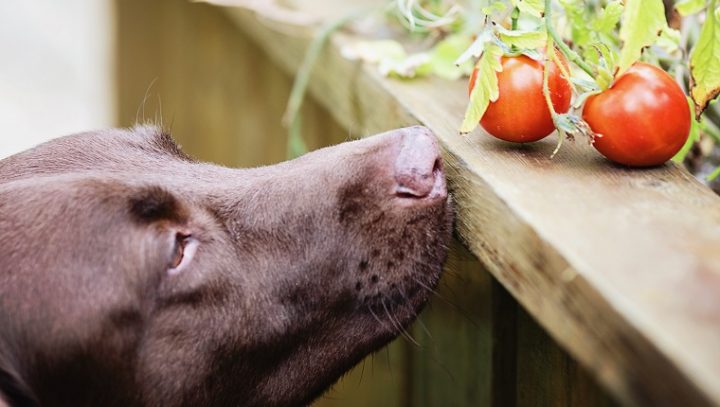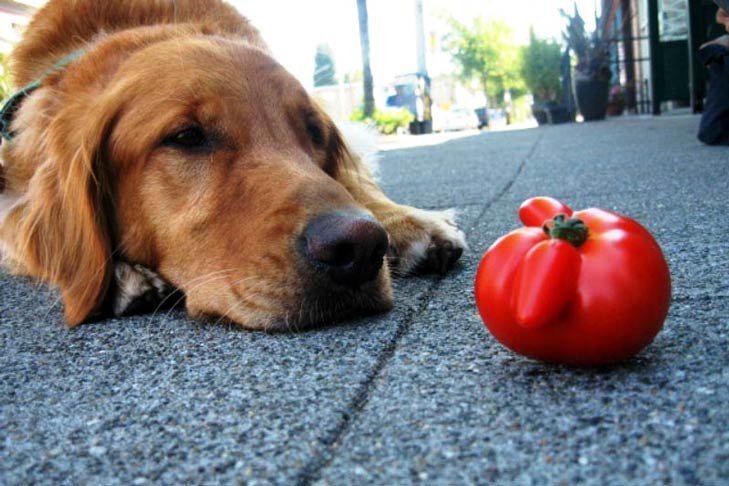Tomatoes are a staple in many dog’s diets, but do you know if they’re poisonous for your pet? According to some experts, the answer is yes. Tomatoes contain a compound called tomatine which can be toxic to dogs and other mammals. Ingesting too much of this compound can cause vomiting, diarrhea, stomach pain, and even death in dogs and other mammals. If you have a dog that loves tomatoes, it’s important to be aware of the toxicity levels and ensure they don’t consume too much. Otherwise, you may need to seek veterinary care for your pet.
Why can’t dogs eat tomatoes?
Dogs can’t eat tomatoes because the fruit contains a chemical called tomatine which is toxic to dogs. Tomatine is found in all plants and is responsible for the sour taste in tomatoes. In small amounts, tomatine isn’t harmful to humans but it can be fatal to dogs if ingested in large quantities. As with any foodstuff that’s poisonous to dogs, it’s important to keep them away from ripe tomatoes and any other plants that contain tomatine.
Are cherry tomatoes bad for dogs?

Cherry tomatoes are not poisonous to dogs, but they may cause them to get sick if ingested in large quantities. Cherry tomatoes are a source of vitamin C, which is beneficial for dogs’ health. If your dog ingests cherry tomatoes, you should take him or her to the vet for an opinion on whether he or she is suffering from an illness and, if so, what should be done about it.
How much tomato should I give my dog?
Tomatoes are a common ingredient in many dog foods, but can they be harmful to dogs? According to Penn State College of Veterinary Medicine, tomatoes are not poisonous to dogs and can even provide some nutritional benefits. However, like most fruits and vegetables, excessive ingestion may cause vomiting and diarrhea. Dogs that are allergic to tomatoes should not eat them.
Can I feed my dog cooked tomatoes?
If you are feeding your dog cooked tomatoes, it is important to be aware of their toxicity. Raw or unripe tomatoes can be poisonous to dogs and can result in vomiting, diarrhea, and even death. Fresh tomatoes however, are not as toxic and should not cause any serious issues if fed in small doses. If your dog does get sick after eating tomatoes, consult a veterinarian immediately.
Are cucumbers bad for dogs?
Cucumbers are not poisonous for dogs, however they can be sour-tasting. Tomatoes, on the other hand, can be harmful if ingested by a dog. Both cucumbers and tomatoes can cause intestinal upset if eaten in large quantities and should only be given to small puppies or dogs who have been trained not to eat things off of the ground.
What foods are toxic to dogs?
There are a few things that may be toxic to your dog if ingested. These items can cause immediate and serious health problems, so it’s important to be aware of them and take steps to prevent them from harming your pup. Here are five foods that are harmful to dogs:
Tomatoes: Tomatoes are a common food item that can be poisonous to dogs if consumed in large quantities. The amount necessary for toxicity is unknown, but ingestion of even a small quantity can result in vomiting, diarrhea, and abdominal pain. If you think your dog has eaten something that may be harmful, consult with a veterinarian as soon as possible.
Macadamia Nuts: Macadamia nuts are high in omega-3 fatty acids which can help support heart health in dogs. However, like tomatoes, large amounts of macadamia nuts can be harmful if consumed by your pup. Signs of toxicity include vomiting, decreased appetite, diarrhea, and excessive thirst or urination. If you think your dog has ingested a potentially dangerous amount of nuts, contact your vet immediately.
Green Bell Pepper: Green bell peppers contain solanine which is an alkaloid compound that is toxic to both humans and animals when ingested in large quantities. Signs of toxicity include vomiting, diarrhea, seizures, and death. If you think your dog has eaten a dangerous amount of green bell peppers, contact their veterinarian immediately.
Almonds: Almonds are another common food item that can be harmful
Can dogs have potatoes?
Potatoes are great for dogs, but like any other food, they should be moderation in amount. Commonautions include not giving potatoes as a regular meal and monitoring the dog’s vomit and diarrhea. If your dog has an adverse reaction to potatoes, it may be because they are sensitive to one of the potato’s ingredients such as solanine or glycoalkaloids. A small amount of potassium can also cause problems in some dogs, so it is best to avoid giving them high-potassium foods altogether.
Can a dog eat a banana?
Bananas are a great treat for dogs, but they should be eaten in moderation. Dogs can eat a small banana without any problem, but larger bananas can be dangerous. Eating too many bananas can cause vomiting and diarrhea. Bananas are high in sugar, which can lead to tooth decay. If your dog starts to exhibit signs of illness after eating a banana, you should contact your veterinarian immediately.
What vegetables can dogs eat?
Tomatoes are a popular vegetable for dogs to eat, but there is some debate about whether they are poisonous. The National Resources Defense Council (NRDC) reports that while tomatoes can be harmful to pets if eaten in large quantities, they are not poisonous and are typically safe to eat. The ASPCA cautions pet owners to keep an eye on their dog when eating tomatoes, as they could get sick if given too much of the fruit. Raw tomatoes can cause stomach upset in dogs and cats, so it’s important to cook them before giving them to your furry friend.
Are carrots good for dogs?
Carrots are a good source of vitamins A and C, both of which are essential for dogs. These vitamins help keep the dog’s coat healthy and their teeth clean. Carrots also contain beta-carotene, an antioxidant that helps protect the dog’s cells from damage.
However, some dogs may be allergic to carrots, so it is important to check with your veterinarian before giving them to your pet. If your dog is allergic to carrots, you may want to feed them other types of fruits or vegetables instead.
Can dogs have cheese?
Dogs are omnivores, which means that they are able to eat a variety of foods. Cheese is not considered to be a harmful food for dogs, but there are some guidelines that should be followed when giving cheese to your dog.
Cheese can provide important nutrients and minerals such as calcium, phosphorus, vitamin A and zinc. Dogs need these nutrients in order to maintain their health and function properly. However, too much cheese can also be harmful if consumed in large quantities or if it is given to a dog who isn’t used to consuming dairy products.
If you decide to give your dog cheese, make sure to limit the amount given per week and always consult with your veterinarian before giving any type of new food to your pet.
Is watermelon OK for dogs?
Watermelon is a great summer fruit for dogs to enjoy, but it’s important to be aware that some of the watermelon’s ingredients may be harmful if ingested. The sugar in watermelon can cause intestinal problems in dogs, as can the oxalates and citrullines found in the fruit. While these ingredients have been known to be toxic to dogs, there hasn’t been a lot of research on their effects on canine health. So, whether or not watermelon is safe for your pup depends on what else is in the dish and how much of each ingredient is consumed. Be sure to supervise your dog while they are eating any type of fruit – even ones that seem safe!
Is broccoli good for dogs?
Broccoli is a nutritious vegetable, but it’s not always safe for dogs to eat. Broccoli can contain high levels of sulfur, which can be harmful if ingested in large quantities.
Sulfur is an essential mineral for dogs, but too much can be unhealthy. Dogs who consume large amounts of sulfur-rich foods may experience vomiting, diarrhea, and even liver problems. If your dog consumes broccoli regularly, it may be best to limit their intake or give them a treat that contains less sulfur instead.
Some other vegetables that may be risky for dogs to eat include tomatoes and eggplant. These fruits and vegetables can contain high levels of oxalates, which can inhibit the absorption of important minerals like calcium and iron. If your dog consumes these foods on a regular basis, it’s best to monitor their health closely and provide them with additional nutrients such as supplements or fortified food.
Is lettuce good for dogs?
There is some debate as to whether or not lettuce is good for dogs, but the vast majority of experts say it is safe to eat. While there are no guarantees that any single ingredient will be completely safe for your canine friend, most pet food companies take into account the unique dietary needs of canines when creating formulas.
If you’re concerned about your dog eating lettuce, it’s best to avoid giving them whole leaves – instead give them chopped up pieces or try making a salad with other vegetables instead. Additionally, make sure that any salad you feed your pup contains plenty of other healthy ingredients like fruits and nuts so they aren’t getting too few nutrients.
Is cabbage okay for dogs?
Tomatoes are a fruit that can be harmful to dogs if not consumed in moderation. While tomatoes are low in sugar and contain lycopene, an antioxidant, they are still high in acidity which can irritate the digestive system and cause stomach problems. Consumption of large quantities of tomatoes can also lead to poisoning, so it is important for owners to be aware of the dangers posed by these veggies before feeding them to their furry friends.

